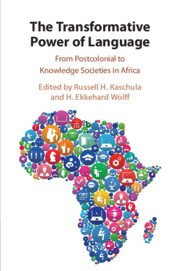Book contents
- The Transformative Power of Language
- The Transformative Power of Language
- Copyright page
- Contents
- Figures
- Tables
- Contributors
- Preface
- Abbreviations and Acronyms
- Introduction
- Part I Mental Decolonisation and Cultural Diversity
- Part II Multilingualism and Intellectualisation of African Languages
- Part III Digitalisation and Democratisation of Knowledge
- Part IV Interlingual and Intercultural Cross-Fertilisation
- 14 Orality in the Digital Age
- 15 Interpreting Research in South Africa
- 16 Exploring the Potential of Increasing Epistemological Access for University Students of African Languages through the Translation of English Academic Texts
- 17 Translation in Foreign Language Teaching
- Index
- References
14 - Orality in the Digital Age
from Part IV - Interlingual and Intercultural Cross-Fertilisation
Published online by Cambridge University Press: 18 September 2020
- The Transformative Power of Language
- The Transformative Power of Language
- Copyright page
- Contents
- Figures
- Tables
- Contributors
- Preface
- Abbreviations and Acronyms
- Introduction
- Part I Mental Decolonisation and Cultural Diversity
- Part II Multilingualism and Intellectualisation of African Languages
- Part III Digitalisation and Democratisation of Knowledge
- Part IV Interlingual and Intercultural Cross-Fertilisation
- 14 Orality in the Digital Age
- 15 Interpreting Research in South Africa
- 16 Exploring the Potential of Increasing Epistemological Access for University Students of African Languages through the Translation of English Academic Texts
- 17 Translation in Foreign Language Teaching
- Index
- References
Summary
This chapter focuses on a particular aspect of South African history in which European men were incorporated into Bomvana and Mpondo societies living along the southeast coast of the former Transkei, where they subsequently founded new clans. With reference to the collection of oral traditions from contemporary members of these clans by various scholars including the author, the role of oral traditions as accurate repositories of historical information and as the products of dynamic social and historical processes is discussed and evaluated. Oral traditions are not only bodies of knowledge but also multidimensional in that they frequently include song, dance, gesture, intonation and other audiovisual elements. As such, they are particularly suited for digitisation and dissemination on the Internet. Oral traditions that have already been documented, and others yet to be accumulated, provide essential educational and scholarly resources in the development of decolonised curricula, and potentially serve as tools for the promotion of multilingualism and multiculturalism in the classroom and beyond.
Keywords
- Type
- Chapter
- Information
- The Transformative Power of LanguageFrom Postcolonial to Knowledge Societies in Africa, pp. 277 - 303Publisher: Cambridge University PressPrint publication year: 2020
References
- 2
- Cited by

